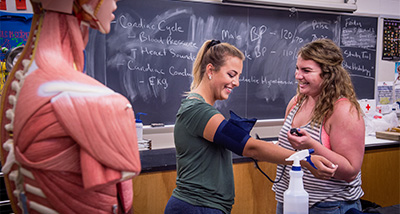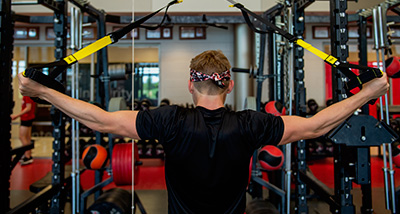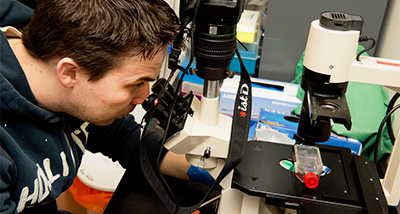

Clinical Exercise Physiology
Why Study Clinical Exercise Physiology?
Graduate | Exercise Science/Science/Health/Health and Human Performance | CEBAH
Turn your passion for exercise and health into a career that transforms lives.
The M.S. in clinical exercise physiology at UW-River Falls gives you the knowledge, skills and clinical experience to help people prevent, manage and recover from chronic diseases and functional limitations, all while advancing your own career in the health sciences.
Designed for working professionals and recent graduates alike, this flexible online master’s program blends evidence-based coursework with hands-on clinical training and a built-in internship, preparing you for high-impact roles in hospitals, cardiac and pulmonary rehabilitation centers and community wellness programs.
You’ll graduate ready to sit for the ACSM Clinical Exercise Physiologist (ACSM-CEP) certification - the gold standard for professionals who use exercise as medicine.
This Program Is a Great Fit If You Want To:
- Work in cardiac or pulmonary rehabilitation, chronic disease prevention or exercise testing and prescription.
- Advance in your current role in exercise science, kinesiology or allied health.
- Gain graduate-level credentials and professional certification while studying online.
- Complete your degree in as little as 12-16 months with personalized faculty mentorship.
Program Details
Key Features
- Multiple start dates: Begin your program in fall, spring or summer – whenever it fits your schedule!
- Accelerated completion: Earn your master’s degree in as little as 12-16 months.
- Blended learning format: Enjoy the flexibility of online coursework combined with a hands-on, on-campus lab one weekend per semester.
- Built-in clinical experience: Complete a supervised internship in cardiac or pulmonary rehabilitation at a regional hospital or rehabilitation center.
- Proven success: The program boasts a 93% graduation rate and 93% job placement in the field.
- Cost: Tuition per credit in 2025-2026 is $550. Total tuition costs may vary depending on textbooks and additional course fees. Find more information about graduate costs.
Curriculum
Admission Requirements
Admissions Requirements:
To be considered for admission to the M.S. in Clinical Exercise Physiology program, applicants must have:
- A bachelor’s degree from an accredited institution.
- A minimum GPA of 2.75 on a 4.00 scale – either overall, in the last half of undergraduate coursework, or in at least 12 graduate-level credits from another accredited institution.
Prerequisite Coursework:
For applicants with a bachelor’s degree in exercise science or a closely related field:
- Statistics or Tests and Measurements – three credits. (Applicants without this course may be admitted provisionally but must complete it before enrolling in EXSS 710 – Statistical Methods in Health and Human Performance.)
- Physiology of Exercise – three credits. (Applicants without this course may be admitted provisionally but must complete it before enrolling in EXSS 701 – Advanced Physiology of Exercise.)
For applicants without a bachelor’s degree in exercise science or equivalent:
- Statistics or Tests and Measurements – three credits
- Physiology of Exercise – three credits
- Exercise Testing and Prescription – three credits
Applicants missing one or more prerequisites may be admitted provisionally and complete these courses prior to or during the first semester of graduate study, with approval from the program director.
Application Process
Application Process:
Applicants must apply online through the Universities of Wisconsin Graduate Application and submit the following supporting materials:
- Official transcripts from all colleges or universities attended, sent directly from each degree-granting institution to the Graduate Admissions Office.
- One letter of recommendation from an academic or professional reference.
- Statement of interest (2–3 pages) describing your career goals, reasons for pursuing a graduate degree and how you plan to apply this degree professionally.
- Professional resume or curriculum vitae (CV).
All application materials should be sent to the Graduate Admissions Office either by email or mail:
Graduate Admissions Office: 103 David Rodli Hall, 410 S. 3rd St., River Falls, WI 54022 Email: gradadmissions@uwrf.edu
- Applications are accepted for spring, summer, and fall start terms.
- Apply early to ensure priority review for desired start term.
- There is a non-refundable $56 Universities of Wisconsin graduate application fee.
Clinical Exercise Physiology
ricky.lopez@uwrf.edu // 715-425-4138
Your Degree:
Graduate
Area of Study:
Exercise Science/Science/Health/Health and Human Performance
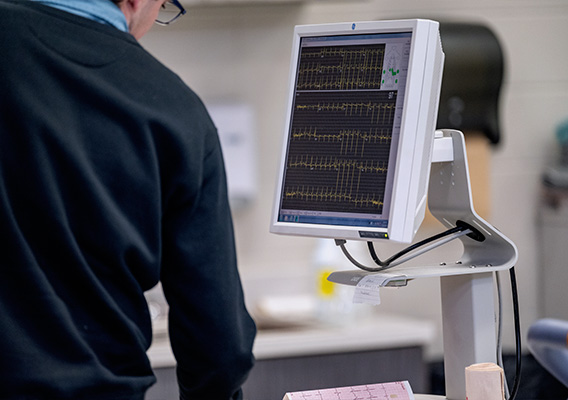
Skills and Learning Outcomes
Graduates of the M.S. in Clinical Exercise Physiology program will be able to:
- Assess and interpret movement, physical activity, and exercise responses in clinical and laboratory settings.
- Design and implement safe, evidence-based exercise interventions for individuals with chronic diseases, functional limitations or disabilities.
- Integrate scientific research and emerging clinical guidelines into professional practice.
- Collaborate effectively with multidisciplinary healthcare teams to improve patient outcomes.
- Demonstrate professional competence aligned with the ACSM Clinical Exercise Physiologist (ACSM-CEP) standards.
Types of Courses
Your coursework blends applied physiology, clinical science and behavioral health to prepare you for advanced practice and certification.
- Advanced Exercise Testing and Prescription
- Advanced Physiology of Exercise
- Cardiac Anatomy and Physiology
- Cardiopulmonary Rehabilitation
- Chronic Disease in Health and Human Performance
- Clinical Patient Behavior Change
- Electrocardiography
- Medical Pharmacology
Courses are offered online and asynchronously, combining flexibility with clinically-focused, evidence-based learning. One weekend per semester, students participate in on-campus, lab-based hands-on activities designed to develop advanced skills in exercise testing, prescription and clinical practice.
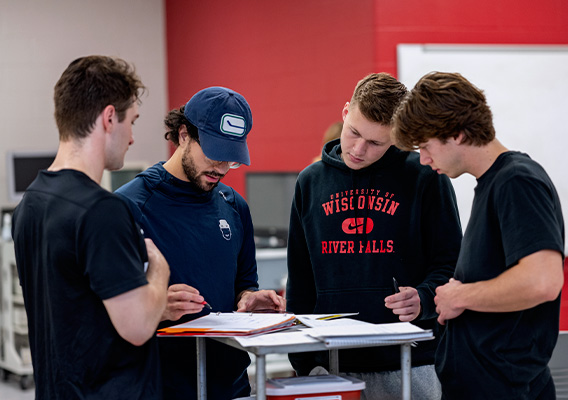
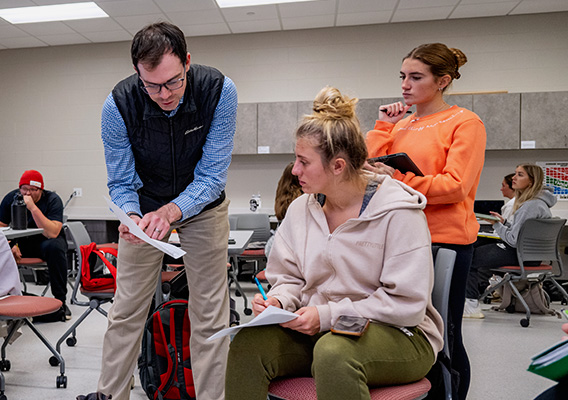
Potential Careers
Graduates pursue careers in:
- Cardiac and pulmonary rehabilitation
- Clinical exercise physiology and chronic disease management
- Human performance and strength conditioning
- Corporate wellness, preventive health and medical fitness
- Medical technology and device industries

